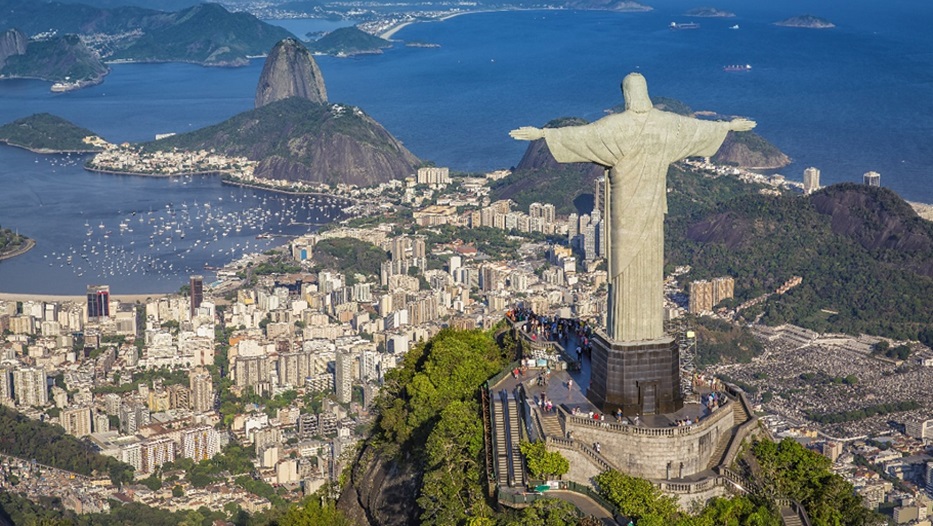admin | 25/06/2020
Interview with Isabel Rata García-Junceda, Head Consultant at the Economic and Commercial Office of Spain in Brasilia
The public health crisis resulting from the COVID-19 pandemic has been an economic challenge worldwide. Isabel Rata, a consultant at the Economic and Commercial Office of Spain in Brasilia, explained to us how they have faced the issue in Brazil and analyzed the region’s economic forecast and its opening to new foreign investments.
1. As someone who is quite familiar with Brazil’s economy, can you give us an introduction on the country’s most important sectors?
Brazil is a continental country 17 times larger than Spain with extensive natural resources and human capital that make it almost one single region full of opportunities.
There are many sectors that offer excellent opportunities, from the primary sector, which represents 5.2% of the GDP and is currently recording outstanding performance, making Brazil the top exporting country in the world for a wide range of agricultural and livestock products, such as sugar, coffee, soy, orange juice, and beef and chicken. This even includes processed foods in its agri-food industry.
For its part, industry represents approximately 22% of the GDP. Some of the notable activities include machinery production, consumer goods and tools, automobiles and components, iron and steel production, textiles, mining, and energy generation, among others
The lion’s share of economic activity in Brazil is focused on the service sector, which represents essentially three-quarters of the Brazilian GDP. IT services and telecommunications, financial services, insurance activities, and trade are also significant.
It also bears noting that infrastructure is a specific source of opportunity. The Brazilian government has decided to improve and expand its infrastructure as a foundation for economic recovery and to establish sustained economic growth with improvements in productivity and competitiveness. This means that there are public policies, such as the Programa de Parecerias de Investimientos (PPI), focused on creating public-private collaborations and reducing the public sector involvement in productive activity in favor of the private sector.
In effect, the government’s current economic policy is focused on giving the private sector greater freedom, opening up the Brazilian economy, and ensuring Brazil takes its place among world powers. In this regard, there are two important components that represent significant opportunities for Spanish companies: joining the OECD, which, apart from integration into a group of more advanced economies, would bring Brazil in line with patterns of more modern economies, helping the Brazilian economy to launch a transactional framework with greater security and predictability; and the signing of free trade agreements with highly important countries and organizations in the world, for instance, the agreement signed between the European Union and Mercosur, wherein Brazil was one of the major parties driving the agreement forward.
2. And the sectors with the greatest potential for the future?
Brazil’s potential for development as a country is enormous taking into account factors such as the abundance of natural resources, a young, energetic population, and its strategic position as a principal market in Latin America.
First, the potential of Brazil’s agroindustry stands out as it is increasingly considered to be a strategic sector in the economy, both due to its high tendency to export and its importance as an employer in rural parts of the country. The country is forecast to continue strengthening its position as one of the world’s main food providers.
In addition, there is also significant potential to export mineral products and generate energy: natural gas, petroleum, and, primarily, renewable energy. It is important to remember that Brazil’s energy system is one of the greenest in the world.
Simultaneously, there is significant space to improve in areas that currently experience shortfalls, such as basic sanitation and water resource management, transportation infrastructure, civil construction, and energy distribution, as developing these areas is now considered a priority in federal investment policies to improve the country’s competitiveness.
Lastly, the service sector represents a clear commitment by the government to create smart cities and digital platforms that enable centralization of administrative processes and reduce bureaucratic red tape, which is considered to be one of the primary components of what is known as the “Brazil cost.”
In addition, having a high proportion of young people in the population has contributed to the process of adapting to using technology and innovative proposals by important companies operating in the country, which have opted for new technologies in areas such as financial markets, the insurance market, online sales, and telecommunications, where notable advancements have been made in the creation of a nationwide 5G network.
3. In your opinion, what sectors in Brazil’s market have been most affected by the crisis caused by the pandemic?
The effects of the crisis caused by the pandemic have been similar to those seen in other countries throughout the world, with a direct impact on sectors that have been forced to stop operations due to social distancing measures, such as the passenger air transportation sector, economic activity associated with tourism, the leisure industry, the hotel industry, and trade.
4. Recently, articles were published on what is known as the Pro-Brazil Plan, which has been proposed as a way to revitalize the economy after the crisis and represents a public investment of $5.5 billion in infrastructure projects.
What will be this investment’s high priority sectors and the most important projects?
The Pro-Brazil Plan is divided into a series of actions classed under two primary aspects, named with the two words in Brazil’s flag: order and progress.

There is significant potential to generate energy: natural gas, petroleum, and, primarily, renewable energy. It is important to remember that Brazil’s energy system is one of the greenest in the world.
Structural and strategic measures are included under the “order” aspect that are intended to improve the foundation and climate for investment in the country, such as the regulatory framework, increased legal certainty and productivity, contributing to creation of a better business climate, and mitigating the crisis’s socioeconomic impacts. Measures associated with investment are included under the “progress” aspect, such as the main public works and options for public-private partnerships.
In terms of the scope, the program is divided into five areas: Infrastructure (transportation and logistics, engineering and mining, telecommunications, and regional development and cities); Productive Development (industry, agro-business, services, and tourism); Human Capital (citizens, education, health and defense, intelligence, public safety, and corruption control); Innovation and Technology (digital chains, creative industry, and science) and Preparative (finances and taxes, legislation and regulations, environment, institutional and international, and values and traditions).
It is predicted that the portfolio of projects under the Pro-Brazil Plan will be defined between August and October. In October, a timeline will be established prioritizing the projects with a faster return for the economy and job creation.
5. In addition to the Pro-Brazil Plan, are other plans/measures expected for the recovery of economic and commercial activity in the country?
The Brazilian government announced its intention to continue the plan of pro-market and economic stimulus measures they stated prior to the pandemic, as well as new emergency measures to address the economic crisis.
In addition to continuing the projects in the PPI, other ministries, such as the Ministry of Infrastructure and the Ministry of Regional Development, are working to create projects that provide the private sector with access to the country’s productive activity and have a significant impact on the foundations of sustainable economic growth.
“The Spanish commitment to Brazil is strengthened by the administration as it is considered one of the countries with Strategic Sectoral Operations (PASE), as defined by the State Secretary of Trade of the Ministry of Industry, Trade, and Tourism under the framework of 2017-2027 Strategy for Internationalization of Spanish Companies.”
Additionally, the government aims to continue with the measures to simplify, remove bureaucratic red tape, and deregulate that were proposed by the minister of the economy, Paulo Guedes, at the start of his term, continuing the agenda initiated by the Law of Economic Freedom, which was put on hold by the current emergency situation created by the COVID-19 pandemic. However, the government is strongly committed to continuing to launch measures that reduce the tax burden on the workforce and stimulate job creation, fight poverty, simplify the regulatory field of key sectors to attract private investment, and stimulate the credit market.
6. In the field of large corporations, on what sector are large foreign investments focused?
Nearly half of direct foreign investment in Brazil is focused on the service sector, particularly financial services, followed by trade and telecommunications, although to lesser extents. And in the industrial sector, there are noteworthy investments in the sectors of electrical distribution and generation infrastructure, natural gas and oil extraction, chemical products, and the agricultural industry. In the primary sector, investments are focused on mineral extraction and agricultural and livestock production.
7. What are the primary requirements that these large corporations must meet in order to successfully bid in the domestic and international tenders in Brazil?
Foreign companies can participate in tenders in different ways, either indirectly—by supplying products and services to a Brazilian company participating in a tender or in a consortium with a local company—or directly, meaning that the company must have a legal representative in the country with express power who can receive a summons and act on the company’s behalf in administrative and legal affairs. It is important to note there are new regulations awaiting approval that would remove the need for a local legal representative in order to bid, but it has been postponed as a result of the pandemic.
It also must be noted that there is a new Tender Law (PL 1292/95) that is also awaiting approval. Among other changes, it will create a new online tender platform where all of the call-for-tender processes will be centralized in order to standardize the regulations for participation and provide greater transparency when awarding the contract. This new law will maintain the preference for domestic products and services, provided that the bid from a Brazilian company does not exceed the price of the foreign option by more than 25%.
8. What is the current extent of Spanish investment in Brazil and in what sectors is it most present?
Bilateral economic relations between Spain and Brazil are based fundamentally on investment. Spanish companies began to reach the shores of the South American giant as part of the first wave of privatization from the mid to late 90s. They are still here 25 years later, perfectly integrated and contributing to the country’s economic growth and creation of employment and wealth. There’s a reason why Brazil is the fourth location for Spanish investment in the world, after the United States and the United Kingdom, totaling an investment stock in 2018 of €48 billion, creating more than 180,000 jobs in the country. It bears noting that almost two-thirds of IBEX 35 companies are represented in Brazil and that their investment here shows a clear commitment to the country and notable profile of continuity.
The presence of large Spanish companies covers a wide variety of sectors, primarily telecommunications, followed by financial and insurance services—such as MAPFRE—energy, and infrastructure.
The Spanish commitment to Brazil is also strengthened by the administration as it is considered one of the countries with Strategic Sectoral Operations (PASE), as defined by the State Secretary of Trade of the Ministry of Industry, Trade, and Tourism under the framework of the 2017-2027 Strategy for Internationalization of Spanish Companies.
9. In your opinion, is there a sufficient degree of maturity in large Brazilian companies in terms of having adequate insurance for their needs?
Brazilian multinationals and multinationals established in Brazil have a high level of maturity. They are top-tier companies that naturally require an adequate, far-reaching insurance market to operate. Economic activity without an insurance market does not make sense, and it lacks sense without a financial sector. And Brazil has that market, where Spain’s presence is represented by one of our largest companies, MAPFRE.
10. In terms of the current context, will the Economic and Commercial Office of Spain in Brasilia maintain the same energy when promoting trade activity?
Absolutely. It is precisely during times of uncertainty when our work becomes more important. Our team in Brazil is ready to advise Spanish companies on any aspects related to internationalization in Brazil.
In the current scenario, the ICEX has adapted some of its personalized services so they can be offered virtually. This is the case for agendas in virtual meetings, a tool that can be used to establish a professional relationship with Brazilian companies of interest to our clients, whether they are in Spain or they have a presence in the market where they wish to explore new areas of operation.
Similarly, the two Economic and Commercial Offices of Spain in Brazil—in Brasília and in São Paulo—have been organizing online seminars to address current topics, such as the pandemic’s effects on the economy and a joint seminar with the Ministry of Infrastructure about future projects and tenders, where future participating companies will be given the opportunity to ask personalized queries to Brazilian authorities. We also continue to work through virtual meetings with companies that contact us and need our support. The tools currently available have been our biggest support.
11. And last, in your point of view, what is the main lesson learned from the crisis caused by the pandemic in international commercial relations?
I believe this time has shown, first, the need to use at different approach for bilateral and multilateral relationships between equal parties, strengthening international coordination to provide a unified response to the unprecedented public health crisis that we are currently facing. This experience must make us aware of the need to develop action plans in the future that enable us to be prepared for potential outbreaks of this specific pandemic and other types of crises that could affect us in the medium term. In this sense, the insurance market must play a fundamental role in working to reduce the uncertainty resulting from these times of crisis.

Isabel Rata García-Junceda (Madrid, July 21, 1976) has been the Head Consultant at the Economic and Commercial Office of Spain in Brasilia since 2016. She has a degree in Economy from the Autonomous University of Madrid, is a member of the Senior Governmental Corps of Commercial Specialists and Economists (2006) as well as the Governmental Corps of Commercial Diplomats (2004). In addition, she holds a Master’s degree in International Iberoamerican Relations and a Master’s degree in Public Administration.





